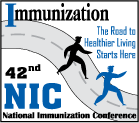
|
|
CDC NIP/NIC Home Page
|
Monday, March 17, 2008 - 11:35 AM
7
Immunization Practices and Knowledge of Obstetricians and Gynecologists
Meaghan Leddy1, Britta Anderson1, Stanley Gall2, and Jay Schulkin1. (1) Research Department, American College of Obstetricians and Gynecologists, (2) Obstetrics & Gynecology and Women's Health, University of Louisville, 555 S. Floyd St, Louisville, KY, USA
Learning Objectives for this Presentation:
By the end of the presentation participants will be able to understand obstetrician-gynecologists' practice patterns, beliefs and knowledge regarding immunization.
Background:
The CDC suggests that women of child bearing age receive preventive primary care visits that include assessment of risk for infectious diseases and vaccination status; however, only one in six obstetrician-gynecologists provided pre-conception healthcare to the majority of their prenatal patients (CDC MMWR 2006).
Objectives:
This research evaluated obstetrician-gynecologists' views regarding the role of obstetrician-gynecologists as providers of vaccines (including HPV) and assessed if there is a gap between immunization recommendations, knowledge and practice.
Methods:
Surveys were sent to American College of Obstetricians and Gynecologists Fellows asking about demographics, vaccination practices, knowledge and beliefs regarding the HPV vaccine, beliefs and knowledge regarding other vaccines (influenza, etc.), and opinions of their immunization education. Analyses only included currently practicing respondents.
Results:
Participants were 51.2% female, with 74.3% practicing general obstetrics-gynecology. 76.4% administer vaccines. 18% agreed that screening is outside obstetrician-gynecologists' practices, 14.4% were neutral, and 67.3% disagreed. Of those who administer vaccines, 96.8% offer the HPV vaccine. 7.3% indicated they had not heard of the quadrivalent HPV vaccine. Views on mandating HPV were more evenly spread out; 34.6% agreed with mandating it, 18.4% were neutral, and 47% disagreed. Approximately 70% of respondents rated their training concerning immunization as nonexistent, inadequate, or barely adequate. However, obstetrician-gynecologists' knowledge of recommendations for immunization during pregnancy was strong. 84.7% indicated the HPV vaccine is not safe for pregnant women, and 98.3% said MMR is not safe; neither is recommended in pregnancy.
Conclusions:
Obstetrician-gynecologists are accepting their role as providers of vaccines, and their knowledge of recommendations is strong. Their views are split on mandating the new HPV vaccine; however, this warrants further research as it is new to the field.